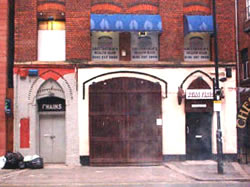
Premises
Originally opening in 1963, the Twisted Wheel started its life as an unlicenced coffee bar/drop-in club in Brazennose Street, Manchester, owned by the Abadi brothers. It was primarily an R&B club, featuring records and many live acts, including The Spencer Davis Group, Long John Baldry, John Mayall and Alexis Corner. American acts on tour such as John Lee Hooker, Solomon Burke and Charlie and Inez Foxx also appeared.
With the arrival of Roger Eagle as the DJ, a music policy of a blend of hard Rhythm and Blues and emergent American soul music soon caused the Twisted Wheel the place for any self-respecting Mod to be seen at.
Jenny Lovie, a regular at the Twisted Wheel in the early 60s, fondly recalls:
There was nothing quite like the excitement of my first visit to the "Wheel". Walking down Brazennose Street in Manchester and seeing all the scooters with their hundreds of wing mirrors curving up like wings, the sunlight reflecting off them making it nearly impossible to see. The Mods lounging on the scooters in their parkas and mohair suits (and in this particular summer the "Faces" wearing their striped blazers). The fear that you wouldn't be able to get in or that people would look at you as you didn't belong - but my friend and I drew no sideways glances, so we must have been accepted. In the queue, waiting to go down the stairs, the anticipation was almost painful. The other girls, dressed like me, in Op Art dresses and with bobbed hair (six months later it was Hush Puppies, tweed skirts below the knee and cropped hair!). Finally, paying a shilling (5p) to join, getting THAT membership card and, as it was in the week, a shilling to get in.
I don't remember who was playing live that night, but I do remember the "buzz" of being there, of exploring all the rooms, with the different music being played, it was like being on another planet and it was amazing. I did get into trouble at home because I missed the 10.30 p.m. train home, as the queue for the cloakroom was so long. But joy of joys I was allowed to get the 11.00 p.m. train home after that. Hereby started nearly two years of joy. I used to go once in the week and on a Saturday when it was 3 shillings (15p) to get in. You could have a night out on 5 shillings (25p), entry to the Wheel, a Coke and train fare there and back. Not bad considering you got to see people like Sonny Boy Williamson, John Lee Hooker and the Spencer Davis Group. I even went some lunch times when you could buy a plate of chips for a shilling (everything seemed to be a shilling in those days) and soak up the atmosphere in your lunch hour. Absolutely brilliant!
On some nights the CID, or Hush Puppies as they were christened, were in. When you were doing the rounds of the different rooms, you could always see a pair of
brand new Hush Puppies peeking out of a dark corner. They were so obvious in those days - in hindsight very amusing!
Among my favourites at the Wheel were the Brian Auger Trinity - he was so brilliant on that organ - I just can't explain how good it was. Georgie Fame, I was
fascinated by the black bongo player, he was really good, and of course, the one and only Spencer Davis Group. I have a really strong memory of watching Spencer
Davis one night. I was standing about a foot away from Steve Winwood and his piano (I can even remember what I was wearing) and after one song, Spencer Davis
said "We'll do that again as Stevie didn't have his piano plugged in". Amazing what makes a memory isn't it? Some years later, when speaking to Ivor Abadi
about Spencer Davis. He said that they, at one stage, had asked for a rise. His brother Jack was dead against it, but Ivor apparently said to Jack "I think
they might just have something". I also think they got their rise much against Jack's better judgement!! Another lasting memory, as I was never allowed to
go to the all-nighters, was listing to John Lee Hooker one night and he said, "When you come to the all night session I'll be singing some real blues, real
real blues".
I saw many, many good groups at the Wheel (and at other coffee bars in Manchester) but sadly the police managed to close it down and the building was demolished not long after. The Wheel moved to Whitworth Street. I only went there once, but I thought it lacked the atmosphere and the Mod movement was just about fading away. However, northern soul was beginning and that must have been exciting for anyone going to the new Wheel for the first time. I have to say that whilst going to the Wheel didn't make me love my music any more it did broaden my horizons and my taste is extremely diverse. I must just add that if you want a really good trip down Memory Lane there is a 4 CD boxed set called The Mod Collection. I found mine whilst browsing on the Amazon website and believe me it's not to be missed. Brilliant memories and wonderful sounds.
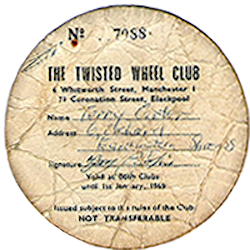
In September 1965, Brazennose Street closed, and the Twisted Wheel relocated to 6, Whitworth Street. A rabbit warren of rooms, it was dark, sweaty and atmospheric. On entering the club, you were greeted with a reception area and a soft drinks bar. At this level, you could also find the toilets, which like all northern soul venues both reeked and flooded, attributes which did not prevent the usual all-nighter illicit trading of amphetamines. Downstairs, however, was where the action really was. Effectively two rooms, the first was the main dance floor, where along one side was the DJ area, literally caged in by bicycle wheels. The other room could be defined as the live act stage. The "wheel" motif was continued throughout the club, with cartwheels adorning the walls. Some descriptions mention alcoves which had loudspeakers wired to the sound system... if you could call it that. The whole club was run by a thirty watt amplifier.
There was also a sister club based in Coronation Street in Blackpool, but no all-nighters were run here due to licencing restrictions, and the club only opened in the summer.
The Manchester all-nighters were run on a weekly basis, from 11pm until 7.30am. The roll-call of live acts that appeared at the Twisted Wheel during the all-nighters was nothing short of incredible. Ben E King, Junior Walker, Edwin Starr, Jimmy Ruffin, Stevie Wonder... the list goes on and on.
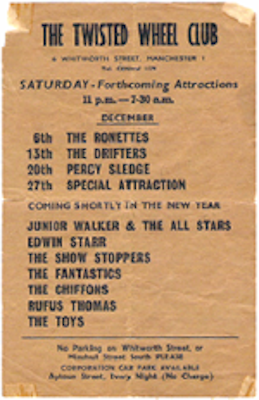
Roger Eagle continued to DJ at the club, mixing Muddy Waters with James Brown, The Drifters and Chuck Berry. It was only when the more elusive UK releases of American origin were started to be played that the Wheel came into a class of it's own. One thing that made the Twisted Wheel different was that the club had a record collection of it's own, locked up securely behind those bike wheels... It is unclear as to whether the sounds being played back in 1965-1967 belonged to Roger Eagle or the Wheel itself, but just look at these examples... "Open The Door To Your Heart" - Darrell Banks, "That's What I Wanna Know" - James Carr, "Candy" - The Astors, "Walking Up A One Way Street" - Willie Tee. Was this the real beginning of northern soul?
Roger Eagle moved away from the Wheel in 1967, but continued to DJ at the Blue Note club, later opening his own club, Stax. The DJ roster was soon augmented by the arrival of an old Hinckley friend, Brian Rae. By now, the R&B bias had been largely replaced by a more soul-oriented style, and the rarer the better. The real turning point in the Wheel's history came, however, at Christmas 1968, when the Wheel's record collection was stolen.
The focus shifted immediately to the DJ's individual collections. In 1969, the arrival of American imports really solidified what is now the structure of northern soul. The others in the DJ team, namely Rob Bellars, Carl Dene, Phil Saxe, Paul Davis, Les Cockell and Brian "45" Phillips began playing more and more US music. Competition between the DJs was fierce, and those with access to US importers soon rose to the top. Rob Bellars in particular often took a chance and ordered records "blind" from the States... one such record was by an unknown artist named Sandi Sheldon. Rob is also credited as being the first DJ to "cover up" a particularly interesting track to prevent anyone else from obtaining it.
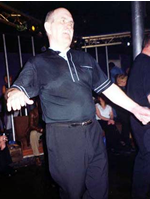
It was around 1969 that the northern soul style of dancing started to develop. The now standard side-to-side shuffling style was being enhanced by more adventurous acrobatic routines and spins. The undisputed star of the dance floor at the Wheel was Frank Booper. It is said that Frank had the ability to stop the dance floor entirely while people gathered round to watch.
Ian Dewhirst is quoted as saying:
Every scene has a king, and Frankie Booper was the number one dancer. Everyone would get out of his way, and he knew it. He was one of those guys who had a strong physique, and he would run up to the wall and do backflips off it. He’d do things of such astounding athleticism.
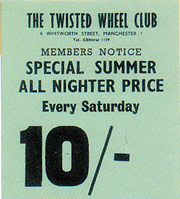
As with most all-nighters, the Wheel had problems with drugs. Chemist's shops in and around Manchester were being frequently burgled, and the local
authorities were of the opinion that it was the clientele of the Wheel that were most likely responsible. In 1970, the Wheel was banned from holding
all-nighters, but after an appeal by Ivor Abadi, re-started them in time for Christmas. The reprieve was short-lived however, and the all-nighters
came to an end in early 1971.
Webmaster's Note:
I have contary evidence as to the fate of Brazennose Street. Phil Williams tells me that Wheel re-opened in 1999 in it's original Brazennose Street
location, but recently Jenny Lovie tells me that the building was pulled down shortly after the transfer to Whitworth Street, and that the Wheel is
now actually under a flowerbed!!
Your Comments on The Twisted Wheel
No comments on this Venue yet.
You can add a comment to this Venue using the form below. Entries will be moderated, so please be respectful!